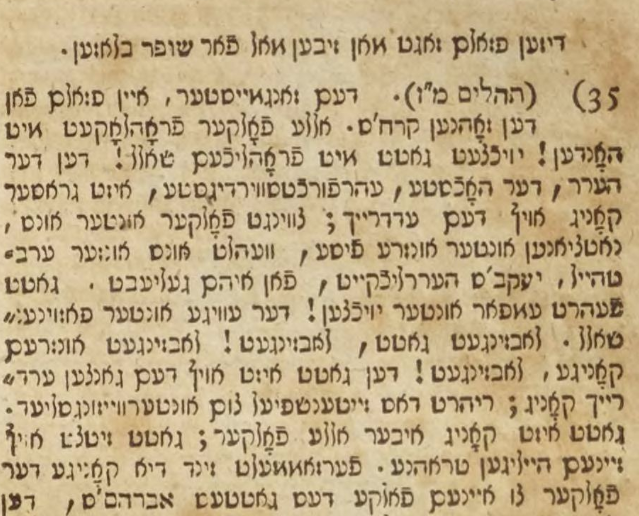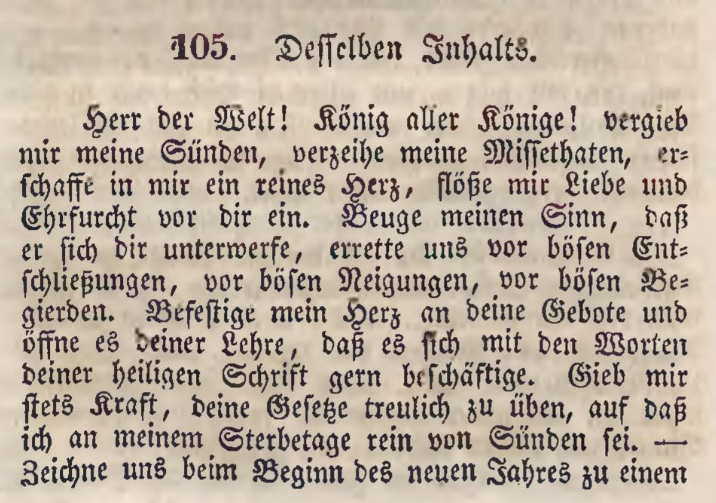| Source (German) | Translation (English) |
|---|---|
Zweites Gebet vor dem Schofar blasen. |
Second prayer before blowing the Shofar. |
Du, Allgütiger, bist der Quell der Wahrheit, und alle Gebote deiner Schrift, und alle Verordnungen deiner Weisen zielen darauf hin, uns die Wahrheiten, die der Mensch im Gewühle der Welt vergißt, in Erinnerung zu bringen. Was der menschliche Leib ist, wenn ihn dein göttlicher Hauch, die Seele, nicht belebt, das ist die Verrichtung eines Gebetes, die Ausübung einer Zeremonie, wenn wir nichts dabei denken.[1] Ausspruch der Rabbinen. Den heutigen Tag nennt deine heilige Schrift Tag des Andenkens, Tag des Posaunenblasens, und vielfach sind die Erinnerungen, die uns heute, wenn wir den Schall des Schofars hören, beschäftigen sollen. Nach der Ueberlieferung unserer Weisen ist heute der Geburtstag der Welt, der Tag, an welchem du das Weltall aus dem Nichts hervorgerufen hast; und so ist das Schofarblasen eine Erinnerung der Huldigung, die wir dir, Schöpfer und Erhalter, bringen. Heute ist der erste der zehn Bußtage und der Schofar ist uns eine Mahnung zur Buße und Bekehrung, zur Besserung unseres Wandels, zum Fassen guter Vorsätze um am Versöhnungstage würdig zu sein der Vergebung der Sünden, die du uns verheißen hast. Der Schofar soll uns eine Erinnerung sein an jene große Begebenheit, wo unsere Vorfahren am Berge Sinai gestanden, und unter Posaunenschall gesprochen haben: „wir wollen thun und gehorchen!” (2. Mose 24, 7) Und so sei uns der Schofer eine Erweckung nach dem Gebote Gottes zu leben, und dem göttlichen Bunde mit unsern Vätern treu zu bleiben. Auch soll uns der Schofar eine Erinnerung sein an die Lehren und Warnungen unserer heiligen Propheten, deren Worte oft mit dem Posaunenschall verglichen werden. Ferner sollen wir uns beim Schall der Posaune erinnern, wie unser heiliger Tempel unter dem Schall feindlicher Posaunen niedergestürzt ist, und mit ihm die Glückseligkeit des israelitischen Volkes. Die große Begebenheit sei uns jetzt gegenwärtig, wie Abraham unser Urvater, seinen einzigen Sohn auf den Altar gelegt hatte, und bereit war, ihn, sein Liebstes auf Erden, zu opfern, so sollen auch wir bereit sein, was uns auf Erden lieb und theuer ist, dir o Gott, und der Tugend zu opfern. |
You, All-Good One, are the source of truth, and all the commandments of your Scriptures, and all the decrees of your sages, aim at bringing to our remembrance the truths that man forgets in the bustle of the world. What is the human body, if your divine breath, the soul, does not animate it; what is the performance of a prayer, the performance of a ceremony, if we think nothing of it?[2] Pirkei Avot. Today your holy scripture calls the day of remembrance, the day of the blowing of the shofar, and many times are the memories that should occupy us today, when we hear the sound of the shofar. According to the tradition of our sages, today is the birthday of the world, the day on which you brought forth the universe from nothing; and so the blowing of the shofar is a reminder of the homage we pay to you, Creator and Sustainer. Today is the first of the Ten Days of Atonement, and the shofar is a reminder to us to repent and convert, to amend our ways, to make good resolutions so that on the Day of Atonement we will be worthy of the forgiveness of sins that you have promised us. The shofar should be a reminder to us of that great event where our ancestors stood at Mount Sinai and said under the sound of the shofar: “we will do and obey!” (Exodus 24:7) And so let the shofar be a reawakening for us to live according to the commandment of God, and to remain faithful to the divine covenant with our fathers. The shofar should also be a reminder to us of the teachings and warnings of our holy prophets, whose words are often compared to the sound of the shofar. Furthermore, at the sound of the shofar, let us remember how our holy Temple fell under the sound of enemy trumpets, and with it the blessedness of the Israelite people. Let the great event now be present to us, as Avraham, our forefather, laid his only son on the altar, and was ready to sacrifice him, his dearest thing on earth, so shall we also be ready to sacrifice what is dear and precious to us on earth, to you, O God, and to virtue. |
Zitternd wie die Stimme des Schofer soll unser Herz sich dir heute nahen im Bewußtsein seiner Schuld und sich erinnern des großen Tages des Gerichts, wo keine Heuchelei, keine Falschheit vor dir bestehen kann; und jenes Tages, von dem es heißt: „Alle Bewohner der Welt, alle die auf der Erde sind, werden sehen, wenn sich die Fahne auf dem Berge erhebt, werden hören wenn der Schofer geblasen wird.” Dann wird Gott die Todten erwecken, dann werden wir einsehen den Unterschied zwischen Tugend und Laster, zwischen denen, die auf Erden Gott dem Herrn gedient, und denen, die sein Wort verworfen haben. Und viele von denen die im Staube schlafen, werden erwachen, diese zum ewigen Leben und jene zur ewigen Schmach. Stärke unsern Willen, Allgütiger, daß wir die Vorsätze, die wir in dieser heiligen Stunde fassen, getreulich ausführen mögen, und uns werth machen vor deinen Augen, des Glückes dieser Erde und der Glückseligkeit der bessern Welt. Amen. |
Trembling like the voice of the shofar, our heart should approach you today in the consciousness of its guilt and remember the great Day of Judgment, when no hypocrisy, no falsehood can stand before you; and that day of which it is said: “All the inhabitants of the world, all those who are on earth, will see when the flag is raised on the mountain, will hear when the shofar is blown.” Then God will raise the dead, then we will see the difference between virtue and vice, between those who served the Lord God on earth and those who rejected his word. And many of those who sleep in the dust will awake, these to eternal life and those to eternal shame. Strengthen our will, O Lord, that we may faithfully carry out the resolutions we make in this holy hour, and make ourselves worthy in thy sight of the happiness of this earth and the blessedness of the better world. Amen. |
“Zweites Gebet vor dem Schofar blasen” was translated/adapted by Yehoshua Heshil Miro and published in his anthology of teḥinot, בית יעקב (Beit Yaaqov) Allgemeines Gebetbuch für gebildete Frauen mosaicher Religion. It first appears in the 1829 edition, תחנות Teḥinot ein Gebetbuch für gebildete Frauenzimmer mosaicher Religion as teḥinah №36 on pp. 44-46. In the 1835 edition, it appears as teḥinah №33 on pp. 49-51. In the 1842 edition, it appears as teḥinah №35 on pp. 52-54.
We welcome corrections and improvements. The transcription of the German from Latin script in Fraktur type provided machine-readable text for a machine translation by DeepL, which we then edited for accuracy and clarity. –Aharon Varady
Source(s)



“Am Neujahrstage, Zweites Gebet vor dem Schofer blasen | On Rosh haShanah, a second prayer before the Shofar is blown, a teḥinah by Yehoshua Heshil Miro (1829)” is shared through the Open Siddur Project with a Creative Commons Attribution-ShareAlike 4.0 International copyleft license.










Leave a Reply